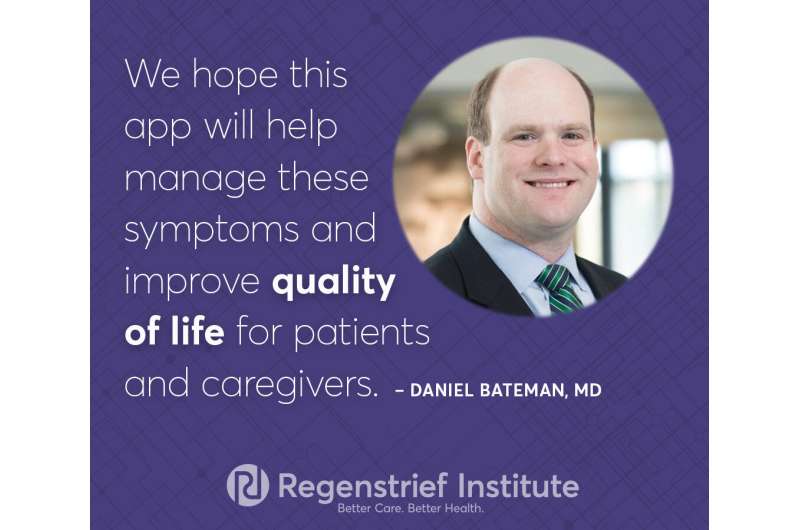Regenstrief Institute research scientist Daniel Bateman, M.D. is testing the effectiveness of Brain CareNotes , a novel mobile app for assessment of dementia symptoms. Credit: Regenstrief Institute
A Regenstrief Institute research scientist is testing a novel mobile app designed to improve care for people with Alzheimer's disease. Daniel Bateman, M.D., has received a career development award from the National Institute on Aging to test the feasibility and usability of the revised Brain CareNotes app.
Approximately 97% of people with dementia experience behavioral and psychological symptoms of dementia (BPSD) during the course of their illness. Those symptoms can include depression, anxiety, hallucinations, agitation, apathy, and many more. These conditions can cause many problems for people with dementia and for their caregivers, including a higher death rate, greater use of the emergency department, earlier placement in a nursing home and greater burden on caregivers.
Dr. Bateman, a geriatric psychiatrist, hopes the Brain CareNotes app will help ease some of those problems. "These symptoms cause real struggles for patients and the people who are working to care for them," said Dr. Bateman, a research scientist at the Indiana University Center for Aging Research at Regenstrief Institute. "We hope this app will help manage these symptoms and improve quality of life for patients and caregivers."
The Brain CareNotes app was designed by Regenstrief researchers, including Dr. Bateman, Richard Holden, Ph.D., and Malaz Boustani, M.D., in partnership with the Sandra Eskenazi Center for Brain Care Innovation staff, including Catherine Alder, JD, and with Youngbok Hong, MFA, and Aaron Ganci, MFA, who are faculty at the Herron School of Art and Design at IUPUI. The development team conducted multiple focus groups, interviews and user tests with clinicians and caregivers to create the user-centered app.
In Dr. Bateman's new study, patient-caregiver pairs from the Healthy Aging Brain Center at Eskenazi Health will be randomly put into two groups. One will receive usual care provided by the center, which involves an interdisciplinary team of providers. The other group will use the Brain CareNotes app in addition to receiving usual care from the team.
In the group using the app, caregivers will receive prompts on their phone to fill out a symptom questionnaire. If the answers reach a designated threshold of concern, the patient's care providers will be notified and will follow up through a phone call, a message, or other form of communication.
The goal of this study is to determine if it is practical and tolerable for caregivers to complete the questionnaire, as well as to assess whether completing the survey document leads to improved care and health. Researchers will also evaluate if the app changed the behavior of the clinicians.
"Healthcare is moving mobile," continued Dr. Bateman. "There are never going to be enough providers to manage the number of people with Alzheimer's disease and dementia, which is only going to increase. We hope the Brain CareNotes app will maximize each geriatrics care worker's ability to make an impact and improve care."
Dr. Bateman and his team hope that if this trial is successful, the Brain CareNotes app will eventually be used to improve care across the country and around the world.
Provided by Regenstrief Institute




















